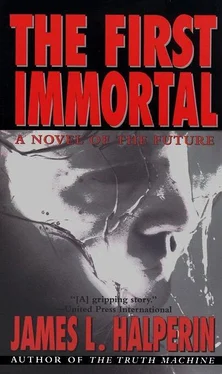Then she stopped.
Why?
“Make love to me, Ben,” she demanded.
“I thought we were going to wait,” Ben said, chest heaving, heart pounding.
“Please. I can’t wait any longer.”
“You might regret it.”
“I’m not a child,” she said, her face flushed as though painted in red shades of resolve. “I’m nineteen years old. I love you, you love me.”
“We’ll be married in six weeks. Just six more weeks.”
“I don’t want to wait six weeks, or six minutes. I want you now.”
“What about our appointment this afternoon?”
“ Because of that.”
Now Ben understood.
He kissed her and she kissed back with such urgency, such passion, it almost felt like the other Marge was kissing him—the real Marge. But only for a moment.
“Oh, my darling,” he said. “If that’s what you want…”
Part of him felt relieved to have it over with. Margaret had saved herself for him all those years, just as she’d always promised, just as he’d been waiting for her. Sure, they’d each found release by the other’s touch, and in the VR and other sensual devices they’d shared. But nineteen was too old to remain a virgin in today’s world, so the tension had finally been lifted. Real sex felt wonderful, too; more tangible than what they’d been doing, and not nearly as uncomfortable as he’d dreaded it might be.
Yet something hadn’t been right. Did he feel he’d been cheating on Marge somehow? No, that wasn’t it.
Thank God Margaret hadn’t inquired how he felt afterward. She must have known better than to ask.
Although they’d traveled separately, Ben, Gary, and Margaret each arrived at Neural Nanoscience Labs within a minute or two of their one-thirty P.M. appointment. Virginia and I were waiting.
“How many times have you actually performed this procedure?” Gary asked Virginia. He knew specific-memory implantation was a brand-new discipline, and didn’t envision his beloved Margaret as the ideal guinea pig for it.
“Six,” Virginia said, “and the last one actually worked… we think.”
Before Gary had time to pull Margaret out the door, Ben and I laughed in unison, “She’s kidding, Gary.”
“Oh, you think that’s funny?”
“Sorry, I can’t help myself,” Virginia said. “Fact is, we’ve done almost 1,600 of these without the slightest hitch. That doesn’t mean the procedure shows identical efficacy with every subject. Just means we haven’t had anyone who wasn’t glad they did it.”
“Explain how it works again,” Gary said.
I began: “For three and a half decades we’ve known how to implant generic memories into human brains—as long as we were willing to lose any unique memories. Sort of like erasing a twentieth century computer’s floppy disc to add new information. You could always replace an entire file on a floppy, but until around 2010 there was no way to add and subtract specific data from a file without going back inside the computer.”
“Okay. I remember that.”
“When we started Caching people, Virginia and I figured: Since we have to store all this information anyway, why not program our AIs to analyze each component of it? After all, the AIs from last month’s line are at least a hundred times more complex than human brains.”
“That way,” she explained, “we’d learn how to dissect individual memories piece by piece. We could take any specific memories from one person, and implant them into another person without disrupting any of their existing memories.”
I nodded. “So, after about the one thousand one hundredth Cache—”
“One thousand one hundred seventh,” Virginia interrupted.
I pretended to glare at her; she grinned, of course. “Okay,” I said. “After 1,107 of ‘em, the AIs had cataloged every molecular pattern, effectively cracking the human memory code. Big breakthrough! Obviously there’s an astounding number of applications for stored memory. We hope to retrieve forgotten memories with absolute certainty, erase selected traumatic events from someone’s life, even produce crude home VR movies from a person’s past experiences. We can also sort a person’s memories by any category we choose, and implant those memories into any other person, with whatever degree of vividness we want. That’s what we plan to do today, with Margaret.”
“I tried to get Alice to undergo the procedure, too,” Ben explained, “but the original Alice’s memories began long before I was born. Besides, she felt that without my father to share those memories—and she doesn’t plan to clone him for another fifty years or so—what would be the point? She considers herself an entirely new person anyway.”
“Not me.” Margaret smiled lovingly at Ben. “But then, I have considerably more incentive.”
“I’d marry you anyway,” Ben said, “and love you forever, whether you do this or not.”
“I know, but I want those memories.” Margaret turned toward Virginia. “So after you implant Ben’s common memories with Marge into my brain, will I recall those events as Marge or as Ben?”
“It doesn’t matter,” Virginia answered. “Within a week your brain will reviewpoint everything. A split second after they’re imprinted, your brain will subsume them the same way it integrates any new knowledge. Human memory has always done that, which is why you can only remember certain things about each experience. Otherwise, memory would be as vivid as life itself, and you’d never be able to retain as much information as you do.”
“Fantastic!” Margaret said. “Now all we have to do is figure out how to deflect Nemesis. After that, what could possibly be left to invent?” This was a rhetorical question, asked amidst the wrong crowd.
I couldn’t resist. “Oh, we’d still be so far from finished, I barely know where to begin. But for starters, we’d need to find places for our ever-expanding populace. With nanoprocessors creating food and other necessities, we can live anywhere. Soon, we’ll honeycomb the earth, and build habitats along Earth’s orbit using raw materials from the asteroid belt.”
“I’ve been studying that proposal,” Gary said. “Micromachines could create space cylinders miles long, and AIs could rotate them just fast enough to replicate Earth’s gravity.”
“Absolutely right,” I said. “With the proper materials, landscaping, and technology, space cylinders would be virtually indistinguishable from this planet. There’s enough matter in the asteroid belt alone to build habitats for half a trillion people. And we’ve barely begun to colonize the outer portions of this solar system. No human has ever been a light-year from Earth. Within a century, we might routinely send peopled spacecraft to other stars, and sometime this millennium, colonize their planets.”
“What about energy?” Margaret asked. “Won’t we run out?”
“No time soon,” I assured her. “Only a billionth of the energy cast by the sun reaches Earth. And atomic energy is for all practical purposes limitless.”
“Then what?” Gary asked.
“There’s plenty to do,” I said. “Subatomic particle manipulation might allow us to form any element from any other: true alchemy. We might even discover the unified theory of physics to help us prevent our universe’s projected Big Crunch. But time is short.” He laughed. “We may only have a couple quintillion years left!”
“Are there any limits to what scientists can accomplish?” Gary asked.
“Of course,” I answered. “The hardiest flexible materials nature permits might only be about twenty times stronger than steel. I doubt we’ll ever travel or transport solids—maybe never even communicate—faster than light-speed. Under singularity conditions, nothing’s predictable, and might never be. No organization, no intelligence, no imagination can conquer even a single law of physics. We’ll push the very limits of those laws, but eventually, whether it’s a thousand, a million, or ten billion years from now, all physical advances may cease, and not just for a year or a millennium. They’ll stop forever.”
Читать дальше












